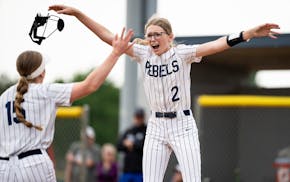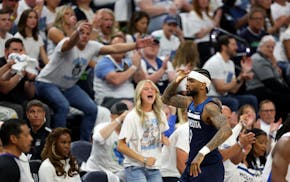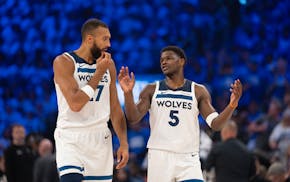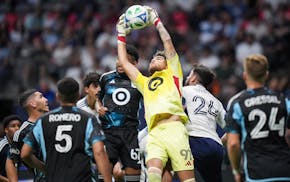The way Minnesota's gymnastics scene was represented at the Tokyo Olympics in 2021 was both illustrative and utterly improbable: Suni Lee of St. Paul, Grace McCallum of Isanti and Shane Wiskus of Spring Park were three of the eight gymnasts on the United States men's and women's national teams.
"We all noticed that nearly 40 percent of the last Olympic teams came from three different clubs in the area," said Mike Hunger, who founded Twin City Twisters (TCT), where McCallum trained. "That was pretty wild and pretty strange. ... But it's not just a recent thing. We have always been good at developing that top level of athlete."
Now the nation's top gymnasts are descending on Minneapolis.
Over the next week, Target Center and the Convention Center will play host to a series of marquee events ahead of the Paris Olympics: the U.S. Olympic trials in women's and men's artistic gymnastics; the national championships in rhythmic gymnastics, trampoline, tumbling and acrobatic gymnastics; the USA Gymnastics National Congress and Trade Show, and USA Gymnastics for All GymFest.
It's the first time all these events have been held in one city. The mammoth production led organizers to dub Minneapolis "Gymnastics City USA."
That undeniable bit of marketing illustrates a deeper truth.
Minnesota has become one of the main hubs for developing gymnasts in America. That reputation has been built over the past few decades by clubs and coaches and the athletes they produce.
John Roethlisberger is a three-time Olympian who won three NCAA all-around titles with the Gophers in the 1990s. He is now a television broadcaster and will be covering the trials and championships.
He said Minnesota has found its place in the national conversation.
"I don't think I'm overstating it when I say that Minnesota is one of the premier states in the country for gymnastics," Roethlisberger said. "Texas is pretty well known for some of its club programs and obviously producing elite gymnastics … but I think Minnesota is extremely special in regards to the sport."
He shared a sentiment that coaches and club owners around the state agreed with: There is something in the makeup of Minnesotans that pairs wonderfully with what it takes to become a top gymnast.
"You have to be tough to get up every day and stand at the bus stop as a kid in 10 degrees. And you have to be tough to commute to work and you get in your car and your spine hurts 'cause it's cold and you just do it," Roethlisberger said. "You just grind in Minnesota. You get up and you work. That's what you have to do to be a gymnast."
Developing elite talent
There are specific designations in gymnastics that determine what routines an athlete can attempt: Levels 1 to 10 and then elite. If you want to be an Olympian, you have to train at the elite level.
A gymnast at Level 10 can be phenomenal — think All-America status in college — but elite training is different. It can require 30 hours in the gym each week starting at a very young age. And there is no offseason for gymnastics; it is a sport that doesn't allow for mental or physical atrophy.
Minnesota had produced top gymnasts throughout the years (Roethlisberger's sister Marie was an Olympic alternate in 1984 and Rhonda Faehn from Coon Rapids was an alternate in '88), but many point to the arrival of Maggie Nichols from Little Canada as a demarcation line for when the state came into its own.
Nichols was a star for the U.S. national team in 2014 and '15, but she finished sixth in the all-around at Olympic trials and wasn't selected for the team at the 2016 Olympics. She retired from elite competition and became one of the most decorated college gymnasts in history at Oklahoma.
Nichols, like McCallum and Roethlisberger, trained at Twin City Twisters.
Lori Roskoski, co-owner of Flips Gymnastics in White Bear Lake and a former gymnast at the University of Minnesota, said Twin City Twisters has been the model for elite gymnastics training in the state. Others have joined the chase.
"We have between 55 and 60 private gymnastics clubs in Minnesota and you have Flips, TCT and Midwest [Gymnastics], those are the three teams that train elite-level gymnastics," Roskoski said. "It's so hard to do. You find these kids when they're little youngsters and you see their natural flexibility and their strength and you start developing them."
All of a sudden, that development exploded in Minnesota. Wiskus, also a former Gopher, trained at Mini Hops in Plymouth and Lee trained at Midwest Gymnastics in Little Canada under Jess and Jeff Graba.
Roskoski said the competition between clubs is healthy and cooperative. The rivalries are intense but start with hugs at competitions. Jeff Graba, who is now the head coach at Auburn, said, "We could see that the competition was tremendous and it was really hard to be one of the best kids in the state."
All of these clubs serve enormous numbers of Minnesotans. Flips and Midwest currently teach around 1,200 students, Twin City Twisters around 2,000.
The TCT gym in Champlin is highly organized and visually overwhelming. Toddlers get their first tumbles in the side rooms. Elite and college-level athletes bounce across mats and twist off bars in acrobatic experimentation in the main gym. Trampoline gymnasts levitate 30 feet in the air before twirling back to Earth.
Steve Hafeman, who co-owns the club, said the development of Minnesota's gymnastics reputation has spread throughout the region.
"Some of the kids that we have as elites aren't from this area," he said. "They come here and they see the gym culture and they fit in because that's how they are. But in other gyms, it wasn't the norm. ... That seems to be a real attraction when they come here from other states."
'Normal' people being extraordinary
While culture and work ethic have been critical to Minnesota's gymnastics identity, it's impossible to quantify the impact of individual athletes like Olympic gold medalist Lee, McCallum, Nichols and Wiskus. The aspirational nature of those gymnasts spreads to every kid training in Minnesota.
"Maggie Nichols is a great example. She's very relatable, she's really good with the kids," Jess Graba said. "Suni does a great job, even in our gym. She's just normal. She walks through the lobby. ... There is no fanfare, she falls, she goofs around, that's what I want the other kids to see.
"You're just a normal person doing extraordinary stuff," Graba continued. "Because you worked your butt off."
The coming days will give plenty of room for Minnesotans to witness that extraordinary level of gymnastics. Lee and Wiskus will get the chance to compete in their home state for a spot at the Paris Olympics.
Roethlisberger referred to it as "the greatest sporting event I think you can go to outside of the actual Olympic Games."
But the people involved with gymnastics here don't view this as a coronation. Instead, it's timely recognition. Clubs are filled to capacity, and more elite-level talent is in the pipeline.
"We feel honored that it's here and that they're recognizing us as coaches and that we have the athletes here, too," Roskoski said. "It shows that they understand Minnesota is at the level of every other elite gym in the country. They see that we're still producing great things."
Star Tribune staff reporter Rachel Blount contributed to this story.

Champlin Park shuts out Rogers 1-0 to win Class 4A, Section 5 softball title

Twins affiliate rained out more than any team: 'Never seen anything like this'

Three key Timberwolves players could enter free agent market

Souhan: If Edwards is a franchise player, he needs to act and play like it

